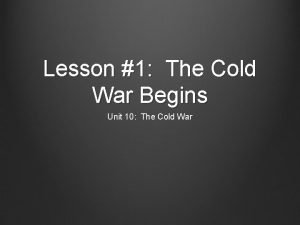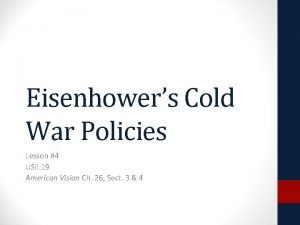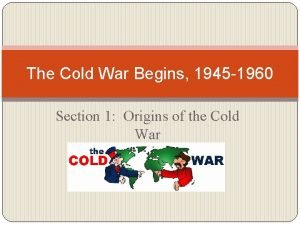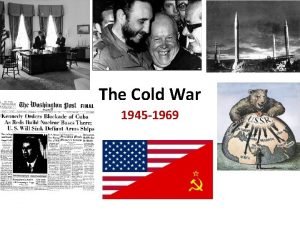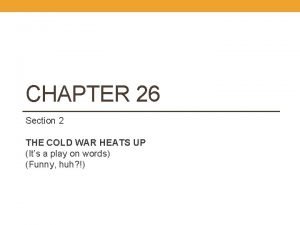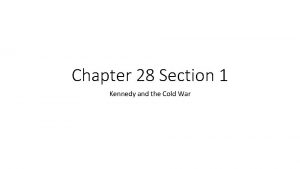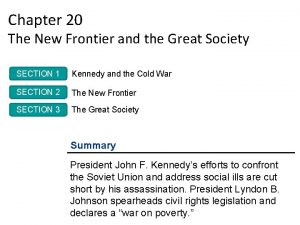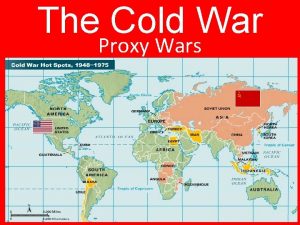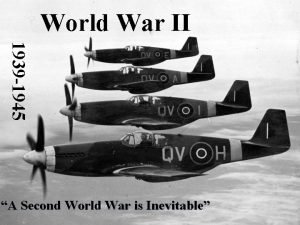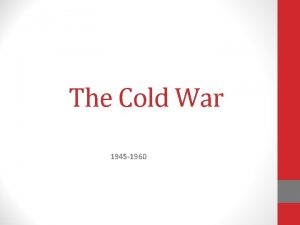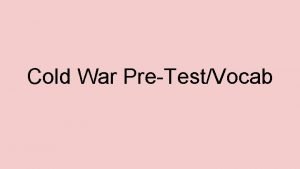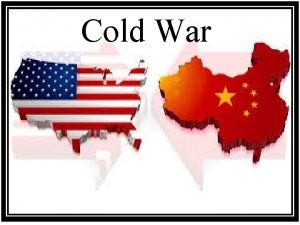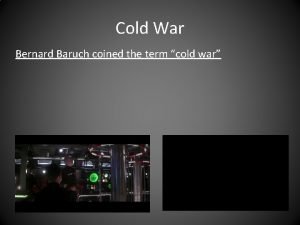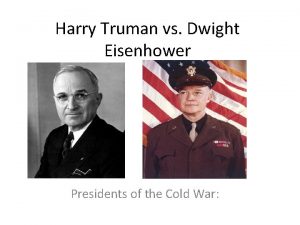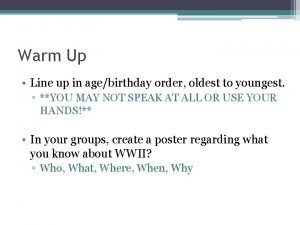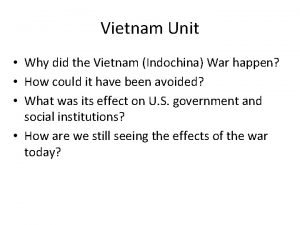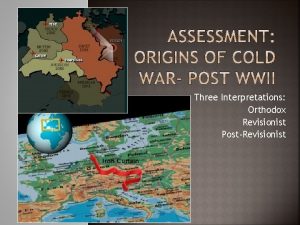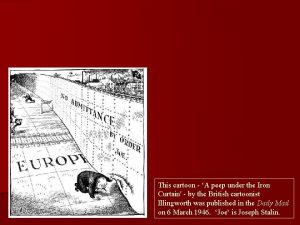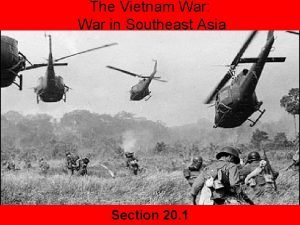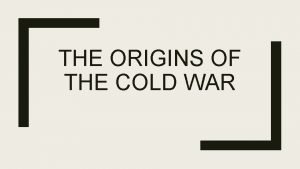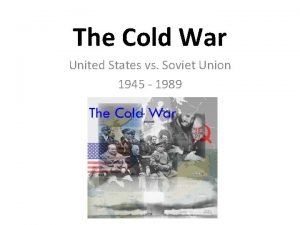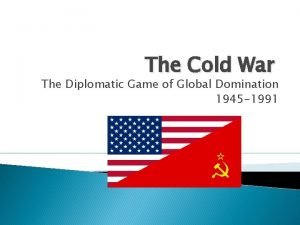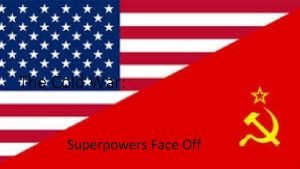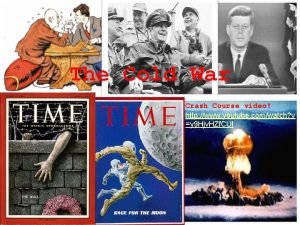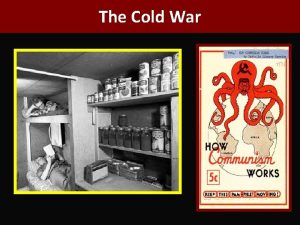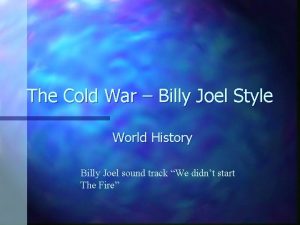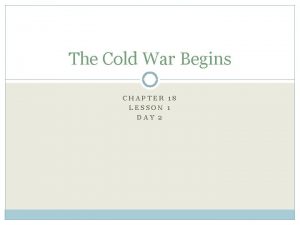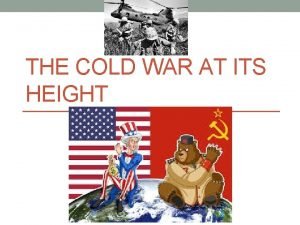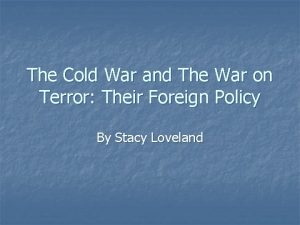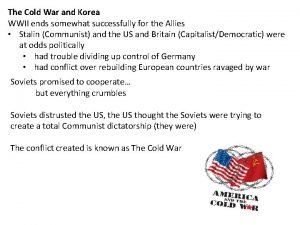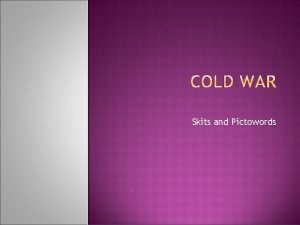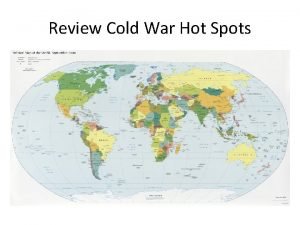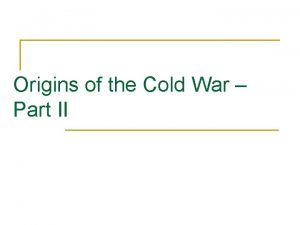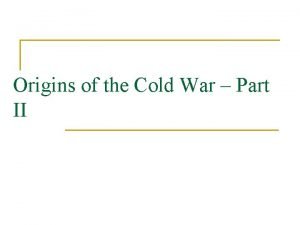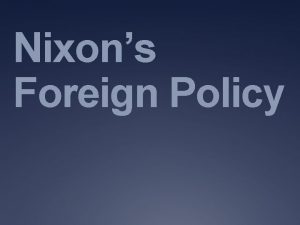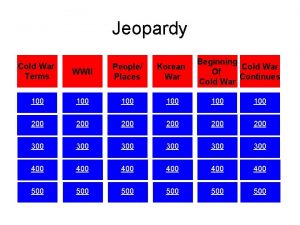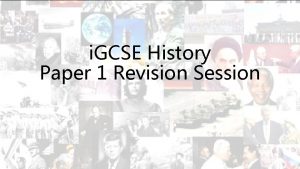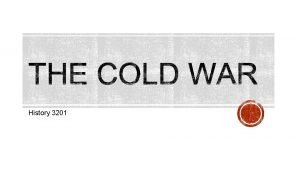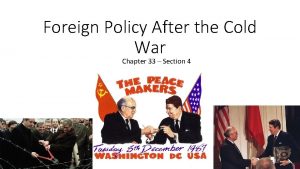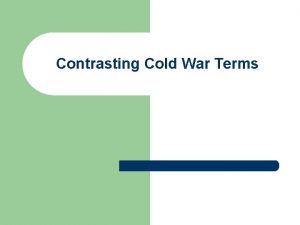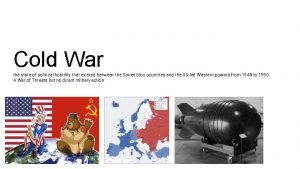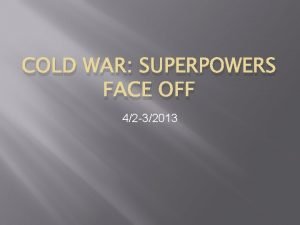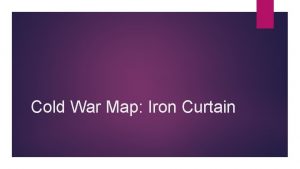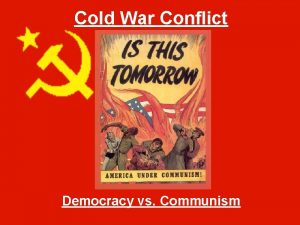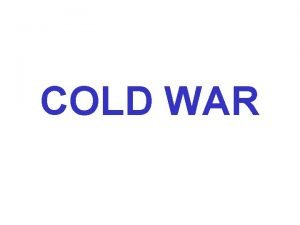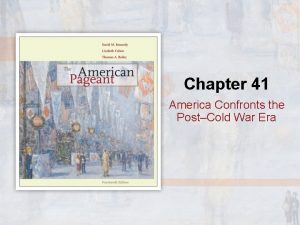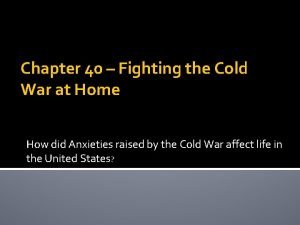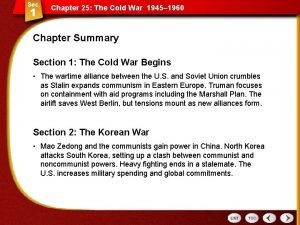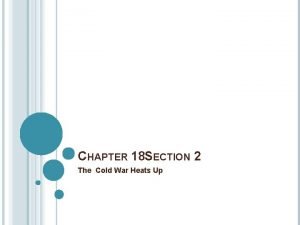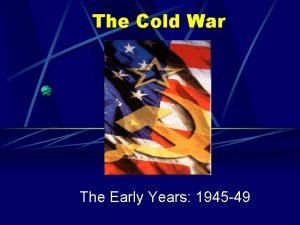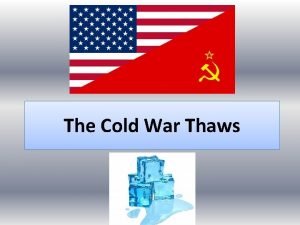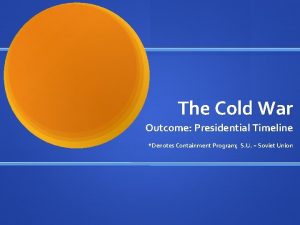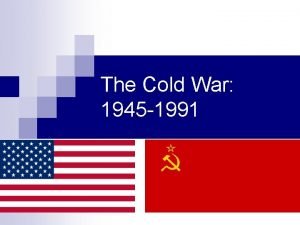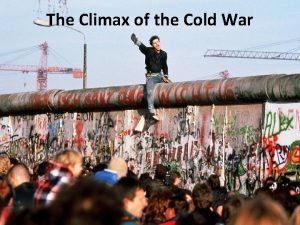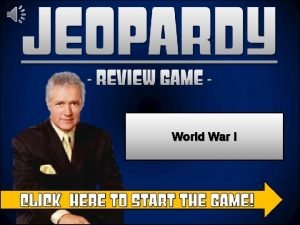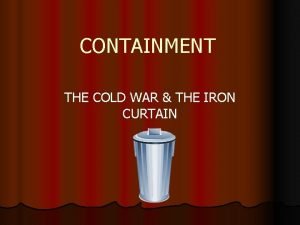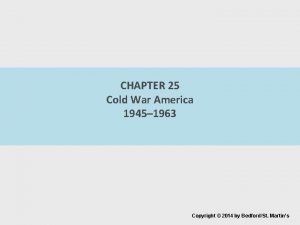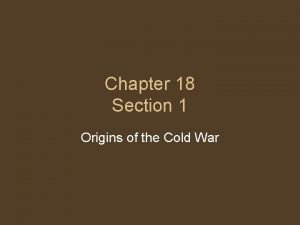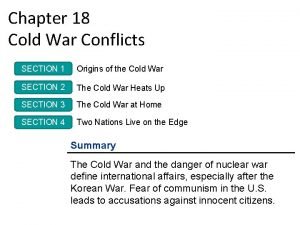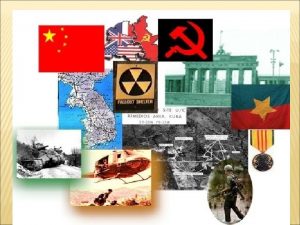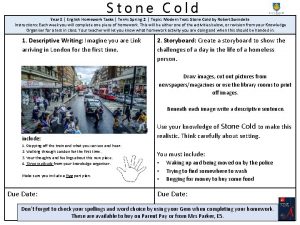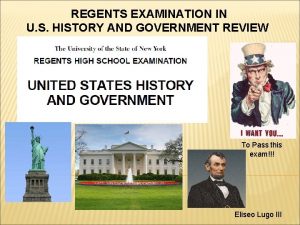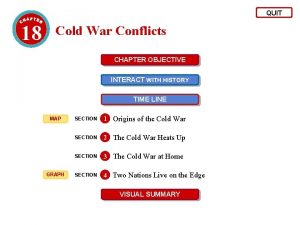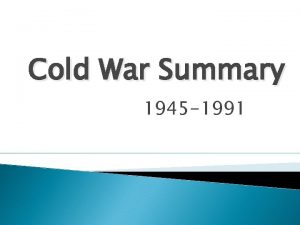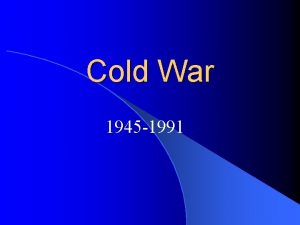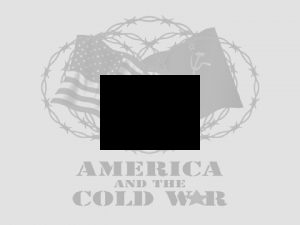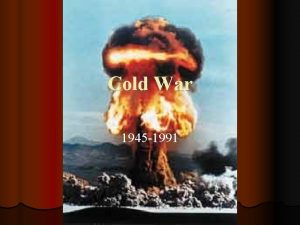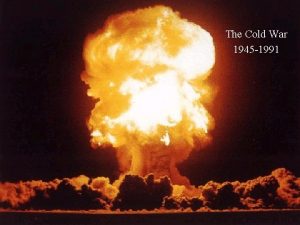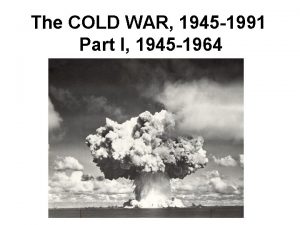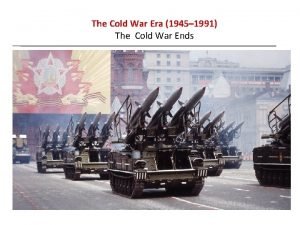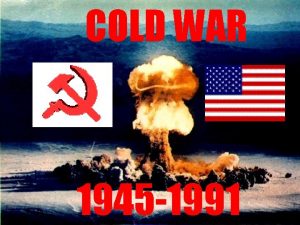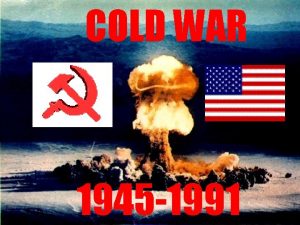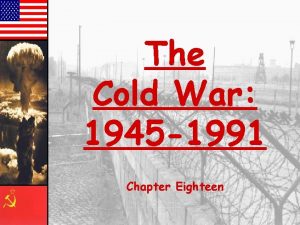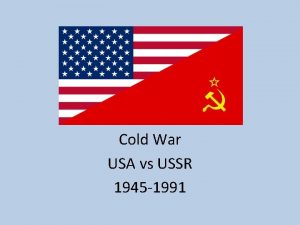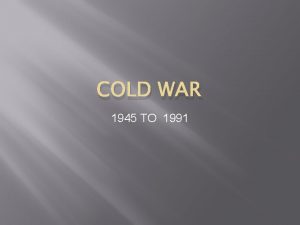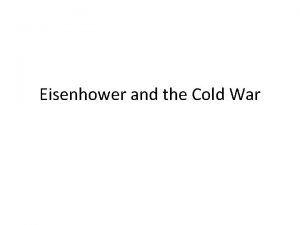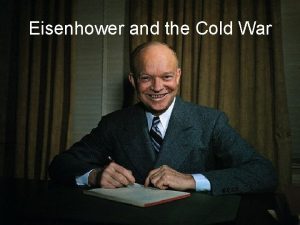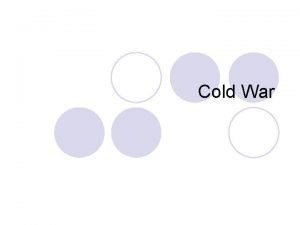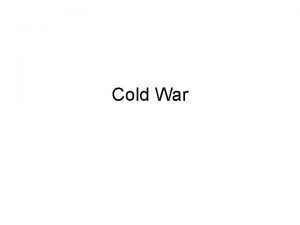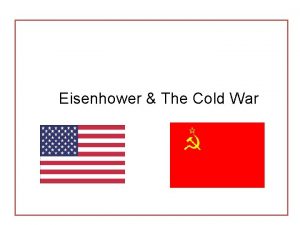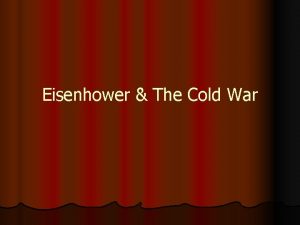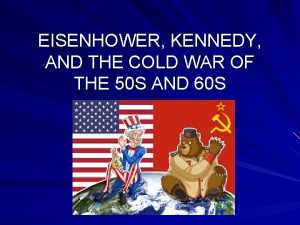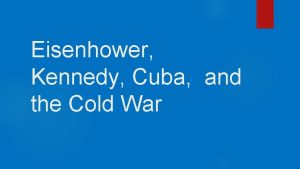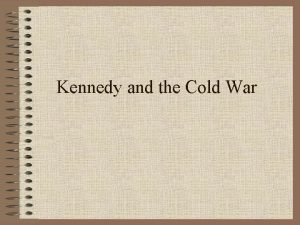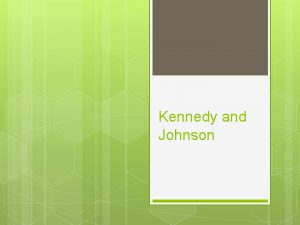Cold War 1945 1991 Eisenhower and Kennedy Eisenhower








































































- Slides: 72

Cold War 1945 -1991

Eisenhower and Kennedy

Eisenhower Promised a change from Containment which he felt was a form of Appeasement: elected in 1952, served two terms, with Nixon as Vice-President A passionate anti Communist; influenced by his Sec. of State, Dulles: he proposed Roll Back (more aggressive / like Mc. Arthur in Korea) over Containment He was also very concerned with the huge military budget (NSC-68 / $50 b +) and hoped to balance the overall budget

Eisenhower turned to a New Look military policy rather than depending on costly armies and navies to fight limited wars as Truman did, he cut back on Conventional Military Forces Reduced army by 500, 000 soldiers, reduced navy by 100, 000 sailors, increased air force by 30, 000, and increased the stock pile of nuclear weapons / Atomic bombs The new defense plan would save about $4 b a year, thereby providing "a bigger bang for the buck, "

He supported circling the USSR and China with more and more US military bases / acquire more allies. By the end of the decade, Dulles had worked out mutual defense treaties with 43 countries around the globe. With a smaller army and navy, and reliance on air force / atomic bombs, this called for Massive Retaliation (rather than small wars) against Communist aggression / attempted expansion The prospect of Massive Retaliation would make the Communists think twice before being aggressive / expanding

But the policy of Massive Retaliation was dangerous – put the US in the position of having to use nuclear weapons / start nuclear or war, or in the position of doing nothing – all or nothing It would be difficult, given the lack of conventional forces, to take the middle ground – conventional war (as in Korea) Critics said that it created a policy of Brinkmanship, going to the brink of war / threatening, but then usually pulling back, doing nothing – limiting US options for response

Eisenhower, however was a realist - knew that nuclear would be destructive. Roll Back was more election rhetoric than reality: though rejecting Containment in his election campaign, he ultimately pursued Truman’s policy of Containment (Eisenhower did not try to Roll Back North Korea – approved of the Treaty / 38 th parallel); never used Nuclear Weapons; only threatened to use them twice; against North Korea and China Unlike Truman, he tried to engage in Détente – a relaxation of Cold War tensions, esp. by finding ways to compromise on the build up of nuclear weapons…started first talks with Soviets since Potsdam and the first ever talks with Communist China

A few weeks after Stalin’s death, he made his famous "Chance for Peace" speech, inviting friendlier relations with the USSR – took advantage of the fact that Stalin had died and that the new leader, Khrushchev, could not be as intransigent He spoke of the high costs of the cold war - money spent on nuclear weapons could be used to end poverty (guns vs butter argument). Called on USSR to come to talks about nuclear disarmament. In Dec. 1953 Eisenhower carried his appeal to the UN. There he proposed an "atoms for peace" plan in which the USSR and US would contribute radioactive materials to a stockpile for peaceful uses.

But as he made these proposals, US scientists continued with their atomic research and on March 1, 1954, the US tested the biggest H bomb ever - the equivalent of 15 m tons of TNT - nicknamed Bravo. The massive explosion in the South Pacific, at Bikini Atoll in the Marshall Islands, created a radioactive cloud that rained deadly silver ash on 7, 000 sq miles of ocean waters and islands – its power alarmed world leaders Finally in late 1954, USA and USSR agreed that their leaders should meet in 1955 - the first face-to-face meeting of leaders since Potsdam in 1945

Met in Geneva, Switzerland. Eisenhower proposed nuclear disarmament and "open skies verification" to create accountability (aerial inspection of each others sites / bases) Khrushchev dismissed Open Skies Verification - nothing came of the summit, but at least the two super powers had begun to talk again There seemed to be a spirit of goodwill - "spirit of Geneva“ – and the agreed to meet again later…. this was the first Détente – relaxing of Cold War tensions

Through the rest of 1955 and into 1956, the Cold War seemed to be thawing / deicing - back in the USSR, Khrushchev, in Feb. 1956, openly condemned “Stalin’s crimes against the Soviet people” (gave the US hope that he was different from Stalin). Moreover, he stated that Capitalists and Communism might be able to live together peacefully / “peacefully coexist” and even declared that the Soviets might tolerate different kinds of Communism (China) – different from Stalin’s Two Worlds Speech But events in Hungary shattered Détente and the Geneva Spirit

New Prime Minister of Hungary, Imre Nagy, inspired by Khrushchev's denunciation of Stalin, announced that Hungary would leave the Warsaw Pact, hold free elections, and called for Soviet troops to evacuate the country The Soviets responded with force. On Nov 4, 1956, they sent 200, 000 troops and 2, 500 – 4, 000 tanks into Budapest to put down an anti-Communist uprising of students and workers: 30, 000 – 50, 000 Hungarians killed; thousands forced into exile

Clearly the Cold War was far from over. And the weaknesses of Roll Back and of Massive Retaliation were exposed; the US had encouraged Nagy, and the student protests, but now stood, doing nothing to stop the Soviet invasion and attacks Events in Hungary put an end to the "Spirit of Geneva".

Any hopes of slowing the arms race fizzled out completely in 1957 when the Soviets tested their first successful intercontinental ballistic missile (ICBM), a long range missile carrying a nuclear warhead. Again, in Oct. 1957, the Soviets shocked the US when they launched Sputnik, the first ever satellite to orbit the earth. They had forged ahead in the Nuclear Arms Race and in the emerging Space Race – it seemed that the Soviets had a clear advantage in science and technology

The US was shocked by advanced Soviet technology US felt there was a “missile gap” As a result of ICBM and Sputnik the arms race intensified. Eisenhower’s response – increased the funding for missiles development by $1 b a year – Launched the National Aeronautics and Space Admin (NASA) to develop missiles, satellites – expanded the B-52 bomber fleet, built submarines outfitted with nuclear missiles, sent more short range missiles to European bases – huge investment in education / science and engineering, through the National Defense and Education Act of 1958

Budgetary concerns were now set aside – the USSR could not be allowed to lead in the Nuclear Arms Race or the Space Race US regained some confidence / caught up / closed the gap when it launched its own satellite and developed its own ICBM in 1958 Yet, Eisenhower regretted that he had created a powerful military-industrial combination / complex (or military -education-industrial combination) that could have an "unwarranted influence" in promoting war

Nuclear Arms Race US – atomic bomb, 1945 USSR – atomic bomb, 1949 US – H bomb, 1952 USSR – H bomb, 1953 USSR – 1957 – ICBM and Satellite USA – 1958 – ICBM and Satellite

Space Race 1957: Soviets - satellite – Sputnik 1958: US starts its space program with opening of NASA – develops its own satellite 1961: Soviet cosmonaut Yuri Gagarin makes history when he becomes the first man in outer space 1961: US astronaut Alan Shepherd becomes the first American in space 1961: Pres. Kennedy commits the US to sending a man to the moon and back by the end of the decade

1961: Soviets are the first to send a man in complete orbit of the earth 1962: US / John Glen become the first American to orbit the earth 1965: USSR are the first to have a man walk in space / outside of air craft 1969: July. Apollo II, US first to land a man on the moon – Armstrong Expensive / high costs – Guns vs Butter argument…costly for Soviets esp. . helped US win the Cold War…forced Soviets to keep up, US forced them into bankruptcy…. they lost

Second Berlin Crisis Nov. 1959 – due to the renewed bad feeling between the USSR and US, Khrushchev ordered the Allies out of West Berlin within 6 months / ultimatum – planned to unify it – as Stalin had tried to do in 1947 Eisenhower diffused this potential crisis by basically ignoring the ultimatum, and by inviting the Soviet leader to visit the US…didn’t panic / over-react…statesmanlike Khrushchev accepted the invitation, and during the visit agreed to withdraw the ultimatum (Camp David Spirit), and they drew up a plan to meet the next year in Paris for another conference about nuclear disarmament

U 2 Spy Plane After the rejection of the “Open Skies” proposal at the Geneva conference, and esp. Soviet development of ICBM and Satellites, the US began making secret high -altitude flights over Soviet territory to take detailed photographs The plane used for these missions, the U 2, was designed to fly higher than Soviet fighter planes and beyond the reach of anti-aircraft fire or surface to air missiles (SAM’s). Eisenhower was uneasy about the flights, worried that they would jeopardize the Paris conference planned with Khrushchev for May 1960

Dulles persuaded him to authorize one last flight - by Frances Gary Powers, on May 1 st 1960, on the eve of the Paris Summit. His plane was shot down by the Soviets over Soviet territory – the US issued a false story that the plane had disappeared while on a weather mission. Khrushchev announced that the plane had been brought down 1, 300 miles into the Soviet Union by a Soviet rocket and that Powers had been captured alive and had confessed his spying activities. Eisenhower then admitted the truth and took full responsibility for authorizing the flight…. but did not apologize to the USSR

Khrushchev was angry – complaining that the incident made him look bad in the Soviet Union where hard liners disapproved of his willingness to negotiate with the USA To regain prestige back home, Khrushchev used the beginning of the Paris Summit conference to denounce the US and then left (same later at a UN meeting in NY)…. nothing came from the Paris Summit…the U 2 incident ruined it and prevented further progress on the issues of Berlin and nuclear arms reduction…Soviet-US relations had been plunged to their lowest point under Eisenhower As Eisenhower feared, the U 2 incident had put an end to his effectiveness as a peacemaker. Because of the U 2 incident, the 1960 s opened with tension between the two superpowers as high as ever

The few hopeful events of the 50 s – the Geneva Summit, and the Soviet Union’s turn away from Stalinism – had been eclipsed by aggression, competitiveness, and mutual suspicion

Eisenhower Expands the Cold War Under Truman the Cold War was fought in Europe and Asia: - Truman Doctrine - Greece, Turkey, Berlin - Marshall Plan – Western Europe - Asia – Containing China and Korea Eisenhower expanded the Cold War to Latin American - Guatemala and Cuba and the Middle East – Iran and Egypt (also Africa? ) while also fighting it in Asia – Vietnam, Taiwan / China – Quemoy, Matsu

After WW II, many small under-developed (“third world”) nations were emerging from former colonialism / imperialism The US and USSR competed to win these over as client states / satellite states during the Cold War –they also had valuable natural resources Many preferred to remain neutral, some had more sympathy with the USSR than with the USA whom they saw as more imperialistic and capitalist – the US had the more difficult task of winning them over

Underdeveloped nations became Cold War battlegrounds – the US and USSR offered material and financial incentives, or outright interference in their affairs (CIA) to stop them falling into the hands of the other side

Middle East; Iran, 1951 US wanted Middle Eastern countries on its side, to keep them from becoming Soviet Satellites US also wanted continued access to their oil resources – in which they had already heavily invested King or Shah of Iran, Reza Shah Pahlavi, a supporter of US investment, was overthrown by a liberal leader Mohammad Mossadegh (Mossadeq), who began nationalizing foreign owned oil resources (US and British esp. )

Shah Pahlavi Mossadegh

as well as concern with losing its oil resource, Eisenhower feared that Iran could become a breeding ground for Communism (Domino Theory) Eisenhower decided to use the CIA to engineer a Coup – Operation Ajax – to overthrow Mossadegh and restore the Shah…propaganda, demonstrations (paid people to demonstrate against “Communist” gov. …) The restored Shah retained power as a dictator until 1979 through a brutal police force – SAVAK – armed and trained by the USA (overthrown in the Revolution led the Ayatollah Khomeini / Islamic Fundamentalism; …anti. American bitterness, hostage crisis)

Considered a victory in the battle for Containment But the US would support a brutal right wing dictator in the name of anti-Communism – another “questionable ally” (South Korea – Rhee; Iran - Shah: Guatemala. Armas: South Vietnam-Diem: Chile-Pinochet…)… US mistakenly associated Nationalism with Communism, and Democracy with Capitalism US had an ally in the regions (others also in Iraq, Pakistan). . considered of great geopolitical importance

Egypt, 1955 New nationalistic leader Nasser succeeded in 1953 Was determined to develop resources and establish the independence of this former British colony, while remaining neutral in the Cold War; traded Egyptian cotton for Soviet arms To keep him from friendship with the USSR, the US offered to fund his plans for a huge irrigation and power plant – the Aswan Dam on the Nile But after Egypt extends recognition to China, US withdraws offer

Nasser then seizes British and French owned Suez Canal – the toll fees ($25 m a year) can pay for the new project at Aswan – and the USSR offers to provide the technical assistance for the project British, French, supported by Israel, invade Egypt to regain control of the Canal UN and US condemn the invasion and demand that they withdraw – divisions among Cold War allies are appearing Ultimately Egypt gained full control over the canal

But the US did not gain from getting the Br, Fr, Israelis to withdraw or from Egypt getting control of the canal Nasser never forgave the Allies – built the Dam with Soviet assistance and remained friendly with the USSR – though never becoming a client state or accepting Soviet dictation Yet, Egypt is considered a loss to Communism in the battle for Containment Did Eisenhower’s over-reaction push Nasser towards the Soviets (as with Castro)?

Response to the loss was the Eisenhower Doctrine, 1957, which proclaimed that the US would offer economic and military aid to "secure and protect the territorial independence" of Middle East nations "against overt armed aggression from any nation controlled by international communism. ” (same as Truman Doctrine for Europe) Implemented when the US sent troops to Jordan in 1957, fearing a coup by pro-Nasser forces, and to the Lebanon, for the same reason, in 1958

Latin America US had huge investments here from years of Dollar Diplomacy Had withdrawn from military involvement since Good Neighbor Policy of FDR Didn’t want to lose investments through Nationalization if Communism emerged, and didn’t want Soviet satellites in the Western Hemisphere; hoped to continue with Monroe Doctrine and keep out USSR influence

Guatemala: In the late 1940 s and early 1950 s the newly elected liberal / left wing govt. of Jacob Arbenz Guzman began to nationalize foreign owned land industries, and to redistribute land to the peasants Included land owned by Americans, esp. by the United Fruit Company (Dulles brothers were big shareholders). After complaints to his govt. Eisenhower instructed the CIA to intervene to help overthrow the Arbenz admin. (Operation PBSUCCESS)

CIA supported a successful coup led by Carlos Castillo Armas, who remained on good terms with the US, but became a brutal right wing military dictator (shades of Iran) Pro - US strong men / military ruled Guatemala until 1990 s Other Latin American nations again accused the US of interference / bad neighbor policy – overthrowing legally elected leaders: when Nixon, Vice Pres. , toured Latin America in 1958, he received a hostile reception in most cities he visited

This pattern of US intervention in Latin America, in the name of Containment - was repeated many times from the 1950 s to 1990 (some argue it was more about protecting US investments) In another example, the Nixon Admin. , in 1973, helped overthrow liberal / socialist Salvador Allende, President of Chile, who, like Arbenz, was nationalizing foreign owned land industries…. CIA With the help of the US, the brutal dictatorship of Augosto Pinochet took control of Chile until 1988

Cuba Controlled by a corrupt repressive military dictator, Fulgencio Batista (right), from 1947 – 1959: supported by USA because he protected US investments, esp. in sugar, oil. . Overthrown by Fidel Castro, in 1959: claimed he was a nationalist, liberal, populist, but not a Communist though his own party, the 26 th of July Movement, had close ties with the Communist Party…and Socialist policies of land distribution. . but more nationalist /anti-imperialist than anything

Visited US in 1960 but Eisenhower refused to meet with him: met by Nixon who treated him disrespectfully and accused him of being a Communist Castro began a policy of partial expropriation of foreign owned land industry (as in Iran, Guatemala) US reaction – partial trade embargo, Castro and the USSR work out a trade deal…USSR replaced USA as buyer / seller

After US oil companies refused to refine USSR oil in Cuba… Castro moved to total nationalization of US owned assets Eisenhower authorized a total trade embargo, followed by end of diplomatic relations between the US and Cuba… alienates / drives Cuba towards USSR…was this necessary? Then authorized the CIA to help train a group of Cuban exiles for an invasion to topple the Castro regime…. . Bay of Pigs

Asia: Taiwan, China, Vietnam Support for Taiwan…two China’s policy…opposes China’s raids on Quemoy and Matsu…threat of nuclear weapons…China backs off…. talks…. first détente with China Vietnam…support for and then replaces French as defender against Communist / Ho Chi Minh expansion…beginning of long commitment…refusal to co-operate with elections proposed by Geneva Accords…over-estimated role of China and USSR… 350 advisers

Eisenhower Essay Differences and similarities with Truman Promised Roll Back, New Look, Massive Retaliation, Brinkmanship…. not applied to South Korea, Hungary But pursued Containment Détente…Geneva, Paris…but Hungary, ICBM, Sputnik, U 2 Spy Plane Berlin, diffused and contained Asia – Vietnam, Taiwan, Quemoy and Matsu Cold War expands to new regions Latin America – Cuba, Guatemala: Middle East – Iran, Egypt

Successes and Failures Successes First Détente Berlin Contained Containment in Iran, Guatemala, Taiwan Nuclear Arms Race, Space Race – closed missile gap, deterrence factor, forcing Soviets into eventual bankruptcy Failures Détente…U 2 mistake No Roll Back…Massive Retaliation means “do nothing”…Exposing Hungarians to Budapest massacre Covert Operations by CIA to overthrow Democratically elected leaders in Iran, Guatemala…. replaced with brutal military dictators Alienating Cuba, Egypt into Soviet Camp Escalating US involvement in Vietnam. . support for Diem Not engaging Communist China…nuclear weapons threat Quemoy, Matsu

Assessment Changes from Truman’s approach / handling of the Cold War? Successes and Failures? – Successes; Détente, Arms and Space Race – forcing the Soviets to spend, Containment of Iran, Guatemala, Taiwan – Failures: alienating Cuba, Egypt…Support for brutal right wing regimes / undermined Democracy (Guatemala, Iran, Vietnam) Arms and Space Race / over-reaction to Sputnik, exaggeration of Missile Gap…escalation of involvement in Vietnam

Kennedy Bay of Pigs, April 1961 In the Summer of 1960 the CIA began secretly training Cuban expatriates – know as La Brigada – in Florida, Panama, Guatemala, for an invasion of the island in the hope of triggering a mass uprising against Castro and overthrowing his regime (Operation Zapata) Kennedy inherited the Plan and approved of it after CIA assurances that it would succeed – but he did not want US involvement in it to be too obvious (no “sneak attack”)…wanted “plausible deniability” ….

On the night of April 17 th, 1961, some 1, 400 Cuban exiles landed on the island’s southern coast at the Bay of Pigs – expecting air support and a spontaneous uprising of the Cuban people. Nothing went as planned An air strike carried out two days before had failed to knock out the Cuban air force, although the CIA reported that it had done so Kennedy had at the last second reduced the air strike, (from 16 to 6 planes) helping to render it ineffective

He then canceled the second air strikes planned to coincide with the actual invasion – the invasion failed Castro turned the failed invasion into a public relations triumph…. triumph of nationalism…defeating the hated imperialist US…became more popular among Cubans The disaster left Kennedy embarrassed. Privately he blamed the CIA and Pentagon for miscalculating and misinforming him. Publicly he accepted blame for the fiasco. He negotiated terms with Castro for the release of the survivors and paid a ransom of $53 m in food and medical supplies. .

But he warned that he would resist any further Communist expansion in the Western Hemisphere: he said that the US did not intend to abandon Cuba to Communism – yet Castro defiantly welcomed more Soviet aid and forged a closer relationship with the USSR. The whole episode pushed the Cubans closer to the Soviets. – and then in Nov. 1961 Castro declared himself to be a Communist…. said that he was always a Communist… Kennedy’s reaction was to agree to the CIA’s plans to assassinate Castro – Operation Mongoose – but several assassination attempts failed

Other Kennedy Cold War Policies Strong anti-Communist. Critical of Eisenhower for not opposing Communist expansion with more force. He abandoned Massive Retaliation and replaced it with Flexible Response and Military Diversification Strengthening the army and navy as well as the air force and increased nuclear weapons. As part of his policy he approved the formation of a new force – The Green Berets – to fight guerilla warfare against communist forces in Latin America if necessary.

He hoped to return to a Good Neighbor policy by devising An Alliance for Progress under which relief projects would be undertaken in impoverished Latin Am countries to eliminate the conditions under which Communism might grow – volunteer graduates were encouraged to give their services. He also set up the Peace Corps which trained volunteers to work abroad on humanitarian projects. Hoped to repair the damage done by events in Guatemala, Cuba / Bay of Pigs and restore relationship with Latin American countries……keep them from becoming Communist, or allies of USSR However, the US relationship with Latin America was not very good in these year because of what they perceived to be continuing US interference in their internal affairs…Yankee Imperialism

Cuban Missile Crisis During the Summer of 1962, Soviet weapons began to flow to Cuba. Kennedy’s first response was to warn that the US would not tolerate the presence of offensive weapons in Cuba. It was first thought that these weapons were defensive in nature – the Soviets insisted they were SAM’s (surface to air) But on Oct 14, photographs taken by American U 2 spyplanes provided evidence that the Soviets were installing medium and long range offensive nuclear missiles (MRBM’s), which were not yet operational (estimated 22 weapons) – could kill 80 m Americans in 5 minutes - might be operational in about 14 days

Khrushchev hoped to protect Cuba from another invasion and to maybe gain leverage with regard to US weapons in Europe, and with Allied presence in West Berlin Kennedy consulted with a specially appointed Executive Committee – EXCOMM - considered doing nothing, air strikes, invasion…. Eventually recommended imposing a Quarantine (Blockade) on Cuba to prevent delivery of more equipment / missiles, as well as a demand that the Soviets remove all the missiles The 13 day standoff is considered the closest both sides came to actual war / nuclear war during the Cold War – “the Cold War’s most dangerous and dramatic event”

Soviet ships carrying more missiles headed towards Cuba, while the US navy prepared a quarantine to prevent them coming within 500 miles of the island. In Florida nearly 200, 000 men and dozens of B-52 bombers were being concentrated as part of a US invasion force The first break in the crisis occurred when the Soviet ships suddenly halted and turned back to avoid confrontation at sea.

A few days later, Khrushchev offered to remove the missiles in return for a US pledge not to invade Cuba: then in a second note he added a new condition, that the US withdraw its weapons from Turkey Kennedy agreed to the first condition but would not make removing weapons from Turkey part of this deal – but gave a private assurance that he would do so anyway – they were obsolete and were in the process of being removed…. . Khrushchev accepted Kennedy was praised for his decisive handling of the crisis, for being tough and determined

The crisis severely damaged Khrushchev’s prestige in the USSR and the world. Kennedy did not escape criticism, however, from some who said he engaged in brinkmanship when private talks might have resolved the crisis without the threat of nuclear war, and without embarrassing Khrushchev (later replaced by the more hard line Brezhnev). Others – hard-liners - believed that he had been too soft and had passed up an ideal chance to invade Cuba and oust Castro.

Kennedy and Berlin In between the Bay of Pigs and the Cuban Missile Crisis, Kennedy was involved in another Berlin conflict with Khrushchev (the third Berlin Crisis) By this time the economy of West Berlin was extremely prosperous. In the 11 yrs since the Airlift, almost 3 million East Germans – 20% of the pop of East Germany – had fled into West Berlin. This great stream of refugees showed the weakness in the Communist economy and its unpopular political system

It was embarrassing for the USSR - Khrushchev wanted to solve the problem At a summit meeting in Vienna, Austria, in June 1961, he ordered the Allies out of West Berlin, or he would cut it off from West Germany Felt he could intimidate the young, inexperienced Kennedy who had shown his limitations through the Bay of Pigs fiasco But Kennedy resisted and threatened war if the Soviets tried to force them out again…nuclear war if necessary

On returning home Kennedy told the nation in a televised speech that Berlin was “the great testing place of Western courage and will”. He pledged that “we cannot and will not permit the Communists to drive us out of Berlin. ” Khrushchev, because of Kennedy’s determination, did not follow through with his threat to cut off the routes, but on Aug. 13, 1961, East German troops built a concrete wall topped with barbed wire which cut the city in two and reduced the flow of refugees to a trickle. The Berlin Wall solved Khrushchev’s problem – ended the refugee issue – but the wall became an ugly symbol of Communist oppression, from which the US gained huge propaganda value (Kennedy wasn’t too unhappy with it)

Detente Events in Cuba and Berlin made both leaders realize how serious the prospect of nuclear was and they both searched for ways to tone down the hard line stance. The one positive consequence of the Missile Crisis was that it scared both sides into finding some kind of accommodation. In April 1963 Kennedy announced that a hot line had been set up between the White House and the Kremlin to enable both leaders to communicate at once should another crisis arise. Later that year the USA and USSR also agreed to a Limited Test Ban Treaty that banned nuclear testing in the atmosphere…. . these two represented mild detente

Vietnam…see other notes Kennedy sends more advisors Sends first troops

Cold War under Johnson – Vietnam…. other notes Cold War under Nixon – Vietnam – and China, USSR, Chile, Middle East China believed in Realpolitik (practical, pragmatic approach to foreign affairs), not idealistic believed in Détente visited China in 1972 (Ping-Pong Diplomacy), Shanghai Communique, improved relations and trade, support for China’s admission to UN, and agreement over Taiwan: he hoped to use the relationship with China to give him leverage with the Soviet Union: playing his “China Card”

USSR signed SALT I and ABM with the Soviets 1973, arms limitation, after visit to Moscow, and a three year Grain deal – the visit to China paid off Chile CIA helped overthrow the elected government of leftist Salvador Allende who was replaced by brutal dictator Pinochet Middle East supported Israelis against Arab nations in October War of 1973 (USSR armed Arab nations), sent $2 b in war materials to Israel and placed US nuclear weapons on alert, helping Israel turn the tide. Arab nations responded with oil embargo, leading to a long cold winter, and a recession and energy crisis. When embargo was lifted, OPEC quadrupled the price of oil – high ever since. See notes on Vietnam

Ford met with Brezhnev and signed arms control deal which led to SALT II (Carter signed this but then Congress rejected, with his consent, after Soviets invaded Afghanistan) Helsinki Accords, 1975. USSR and USA and others, agreed to legitimize USSR’s post WWII borders, and the USSR and its satellites signed a “human rights” guarantee, which included the right to emigrate Middle East: Kissinger orchestrated an agreement between Israel and Egypt stating that force would not be used to resolve their differences, and Israel pledged to return portions of the occupied Sinai to Egypt. Mayaguez, 1975, US merchant ship, with a crew of 39, was captured by Cambodian forces in the Gulf of Siam, when negotiations failed to release the crew, Ford sent in the marines. The crew was freed but over 80 marines were killed or wounded considered sending troops to South Vietnam to rescue it from invasion of North, but decided not to. Did request aid package from Congress for Sth. Vietnam, but Congress refused to support it

Carter Human Rights: the defense of human rights became the basis for US foreign policy under Carter, idealism, rather than Cold Wars issues/supporting anti Communist dictators as in the past; change from Nixon’s realpolitik and containment at all costs of Truman, Eisenhower, Kennedy, Johnson. US economic aid was removed from countries that violated human rights, such as Carlos Armas in Guatemala. Spoke out against suppression of dissent in the USSR, supported freedom of speech of Dissenters such as Sakarov Panama Canal: decided to hand it back to Panama, on condition Panama maintained the canal’s neutrality, and gave the US the right to use it in time of war (possession not taken until 1999) Camp David Accords: Sadat of Egypt accepted an invitation to visit Israel by Begin. Carter saw an opportunity to promote peace, invited both to Camp David, 1978, mediated, where they reached a peace agreement in 1979 (land returned to Egypt in return for recognition of Israel). This is considered his greatest foreign policy achievement. China: building on Nixon’s groundwork, Carter established full diplomatic relations with China in 1979

Afghanistan: invaded by USSR in 1979: Carter was concerned about Soviet expansion, oil supplies – reacted by imposing sanctions on the USSR (grain, technology) and pulled the US athletes out of the Moscow 1980 Olympics. He also withdrew from consideration by the senate SALT II, which he and Brezhnev had agreed …CONTAINMENT Iranian Hostage Crisis: Shah of Iran was force out of power by the Islamic Fundamentalist Revolution led by the Ayatollah Khomeini. The Shah was allowed to come to the US to receive medical treatment for cancer. In response supporters of the Revolution seized the US embassy in Teheran, taking 55 hostages, for 444 days. Carter imposed economic sanctions, tried a disastrous rescue operation / failed…talks failed…eventually the Iranians agreed to release in return for the release of Iranian assets held in the US, but the hostages were not release until the day of Reagan’s inauguration. Lost 1980 election to Reagan: Reagan portrayed himself as the spokesperson for conservative America, promised to cut spending, cut taxes, decentralize power, a military build up, get tough on crime. Supported by New Right (anti-Communist, anti-New Deal), Religious Right (wanted more focus on morality, family), Moral Majority (same groups that supported Nixon)

Reagan Doctrine: opposed Communism, Roll it Back in the Third World. Referred to the USSR as an ‘evil empire” Nicaragua: Sandinistas (Communists) led by Daniel Ortega, had overthrown brutal military dictator Somoza. (Carter had given financial aid to the Sandinistas). Reagan supported the Contras (against the Sandinistas) with guns, food, military advisors, to help them overcome the Sandinistas. Congress, the Boland Act, voted to end US aid to Contras. Reagan got around this by secretly selling arms to Iran (in return for help in getting US hostages in the Lebanon released) (Iran-Contra affair) and then passing on the money to the Contra’s through the CIA and others without Congress knowing. A Secret Government had emerged. Congress, Defense Dept, State Dept. , were not informed. Affair was later exposed. Poindexter, national security advisor (said he didn’t tell the president, so as to give him deniability), Robert Mc. Farlane, former national security advisor, and Oliver North were held responsible and found guilty, but Reagan was not (Teflon President, nothing stuck).

Granada, 1983, marines were sent to overthrow the Communist regime El Salvador: US sent military and economic support to the regime to overcome left wing revolutionaries supposedly supported by Cuba and the USSR. Middle East: Israel invaded the Lebanon to destroy the PLO. 241 marines were killed on a peace keeping mission in Beirut. Bombing of Libya (al Quaddafi), capital Tripoli, believed to be a sponsor of terrorism Poland: anti Communist movement led by Solidarity / Lech Walesa put down. US imposes sanctions on the USSR Nuclear Arms: use build-up of nuclear weapons, and SDI (Strategic Defense Initiative) dubbed “Star Wars” (detection system in space). End to limitation talks until election of Gorbachev (glasnost, perestroika; meetings with Gorbachev in Geneva, Iceland, leading to INF (Intermediate Range Nuclear Forces), first treaty about elimination of a whole category of nuclear weapons with on site verification and inspection (global-zero), not just reduction, of nuclear missiles with ranges of 300 to 3, 400 miles. USSR pulls out of Afghanistan Reagan visits China, agreement about sale of nuclear power plants,

Bush Foreign Policies Panama: US troops were sent to Panama to overthrow Manuel Noriega, under indictment in the US for drug trafficking, was put on trial in the US in 1992 and convicted for helping a drug cartel to smuggle cocaine into the US from 1981 to 1986. USSR: Cold war ends as Gorbachev pulls USSR troops out of Afghanistan, Eastern - Europe, USSR disintegrates, Russia renounces Communism, START (Strategic Arms Reduction Talks) talks between US and USSR, concluded and signed in the summer of 1991, with significant arms reduction, not just limitation of increase: ended the Nuclear Arms Race Operation Desert Shield, 1990: Saddam Hussein / Iraq invades oil rich Kuwait. Bush sends US troops to Saudi Arabia. Operation Desert Storm: after Iraq refuses to leave Kuwait, US and UN attacks Iraq, driving Iraq out of Kuwait, but leaving him in power in Iraq.

Summary Background / Causes / Ideological Differences Conferences – Two World’s Speech, Iron Curtain Truman Doctrine / Containment (Kennan Telegram): Greece and Turkey Marshall Plan (Economic Containment) National Security Act Berlin Crisis – NATO – Warsaw Pact China and Mao Korea: Limited War Nuclear Arms Race Eisenhower, Dulles: New Look, Massive Retaliation, Brinkmanship Space Race, NASA

Latin America (Guatemala, Cuba – Bay of Pigs and Missile Crisis) Kennedy: Cuba, Berlin Wall: Flexible Response, Good Neighbor, Space Race Vietnam: Truman, Eisenhower, Kennedy, Johnson, Nixon Containment: Presidents Truman: Greece/Turkey, Western Europe, Berlin Crisis, China, Korea, Vietnam Eisenhower: Middle East (Iran, Egypt), Latin America (Guatemala, Cuba), Vietnam Kennedy: Berlin, Cuba, Vietnam, Latin America Johnson/Nixon – Vietnam Containment: Continents. Success or Failure? Europe: Greece/Turkey, Marshall Plan and Western Europe, Berlin Crisis (three) Asia: China, Korea, Vietnam Latin America: Guatemala, Cuba…. Chile, Nicaragua (Sandinistas – Contras…. Iran-Contra Scandal…. . Boland Act)
 The cold war lesson 1
The cold war lesson 1 Lesson 4 eisenhowers cold war policies
Lesson 4 eisenhowers cold war policies The cold war begins 1945-1960
The cold war begins 1945-1960 The cold war heats up: 1945 - 1969
The cold war heats up: 1945 - 1969 Chapter 26 section 2: the cold war heats up answer key
Chapter 26 section 2: the cold war heats up answer key Section quiz chapter28 kennedy and the cold war
Section quiz chapter28 kennedy and the cold war Chapter 20 section 1 kennedy and the cold war
Chapter 20 section 1 kennedy and the cold war Cold war sides
Cold war sides 1945 world war ii
1945 world war ii 1945 world war
1945 world war Cold war cause and effects
Cold war cause and effects Pretest communism and the cold war
Pretest communism and the cold war Communist and capitalist countries cold war
Communist and capitalist countries cold war What started the cold war
What started the cold war Eisenhower and truman compare and contrast
Eisenhower and truman compare and contrast Toward civil war lesson 3 secession and war
Toward civil war lesson 3 secession and war Acrostic poem for soviet union
Acrostic poem for soviet union Napalm vietnam war
Napalm vietnam war Cold war
Cold war Cold war iron curtain cartoon
Cold war iron curtain cartoon Operation rolling thunder cold war
Operation rolling thunder cold war Causes of cold war
Causes of cold war The cold war thaws worksheet answers
The cold war thaws worksheet answers Effects of cold war
Effects of cold war Cold war superpowers
Cold war superpowers Cold war crash course
Cold war crash course Cold war characteristics
Cold war characteristics Mafia hula hoops cold war
Mafia hula hoops cold war Lesson quiz 18-1 the cold war
Lesson quiz 18-1 the cold war Cold war height
Cold war height Cold war who was involved
Cold war who was involved Non aligned countries during cold war
Non aligned countries during cold war Two sides of the cold war
Two sides of the cold war Totalitarianism pictoword
Totalitarianism pictoword Cold war hot spots
Cold war hot spots Origins of the cold war
Origins of the cold war Origins of the cold war
Origins of the cold war Whats vietnamization
Whats vietnamization Us board
Us board Agent orange and napalm
Agent orange and napalm Containment soviet union
Containment soviet union Chapter 33 section 4 foreign policy after the cold war
Chapter 33 section 4 foreign policy after the cold war Contrasting cold war terms
Contrasting cold war terms Warsaw pact definition cold war
Warsaw pact definition cold war Chapter 17 section 1 cold war: superpowers face off answers
Chapter 17 section 1 cold war: superpowers face off answers Guided reading cold war superpowers face off
Guided reading cold war superpowers face off Cold war map activity
Cold war map activity Democracy vs communism cold war
Democracy vs communism cold war Cold war reason
Cold war reason America confronts the post-cold war era
America confronts the post-cold war era Chapter 40 fighting the cold war at home
Chapter 40 fighting the cold war at home Cold war summary
Cold war summary The cold war heats up chapter 18 section 2
The cold war heats up chapter 18 section 2 Expansionism cold war
Expansionism cold war Marshall plan cold war
Marshall plan cold war Berlin wall acrostic poem
Berlin wall acrostic poem Cold war presidential timeline
Cold war presidential timeline Truman speech
Truman speech The cold war map
The cold war map Cold war vocabulary
Cold war vocabulary When was the climax of the cold war
When was the climax of the cold war Korean war map activity answers
Korean war map activity answers World war 1 jeopardy
World war 1 jeopardy Iron curtain containment
Iron curtain containment Marshall plan cold war definition
Marshall plan cold war definition Chapter 25 cold war america
Chapter 25 cold war america Origins of the cold war chapter 18 section 1
Origins of the cold war chapter 18 section 1 Origins of the cold war chapter 18 section 1
Origins of the cold war chapter 18 section 1 Cold war us china
Cold war us china Communism cold war
Communism cold war Stone cold war
Stone cold war Watergate cold war
Watergate cold war Cold war tension graph
Cold war tension graph
